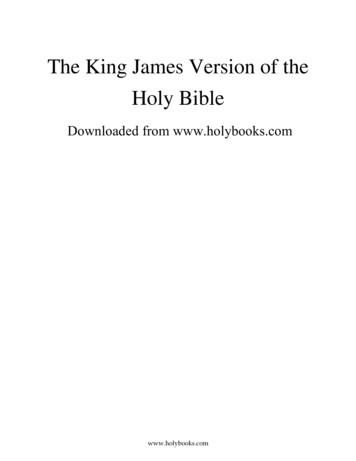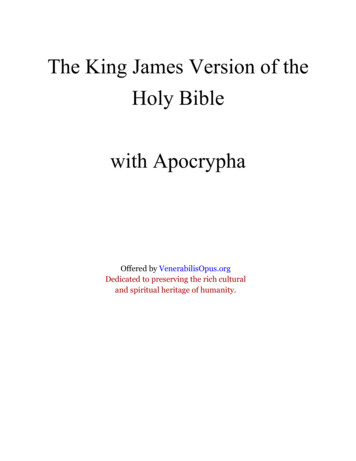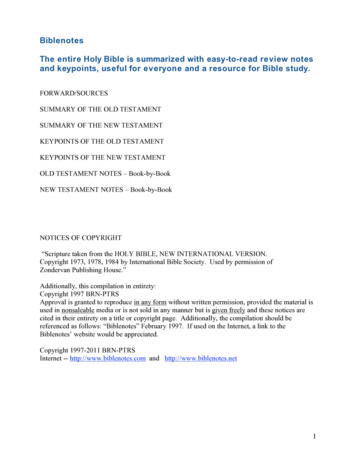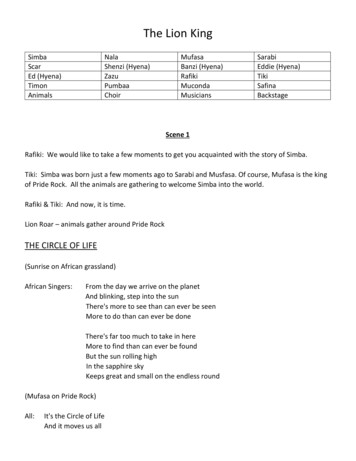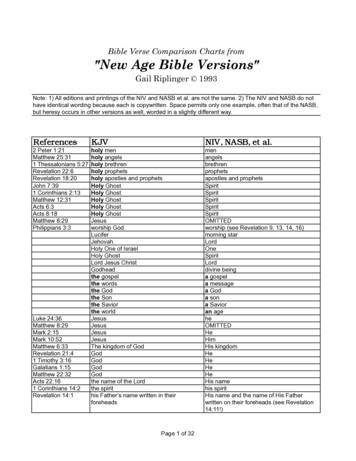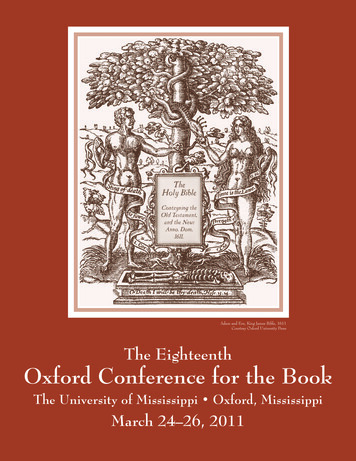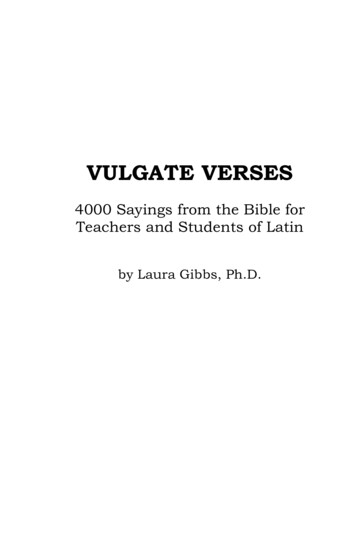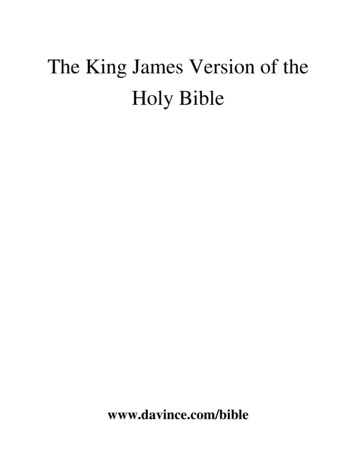
Transcription
The King James Version of theHoly Biblewww.davince.com/bible
Table of ContentsPreface to PDF VersionPreface to 1611 TranslationOld TestamentGenesis . 1Exodus . 31Leviticus . 57Numbers . 77Deuteronomy . 103Joshua . 125Judges . 141Ruth . 1571 Samuel . 1592 Samuel . 1791 Kings . 1952 Kings . 2151 Chronicles . 2332 Chronicles . 251Ezra . 273Nehemiah . 279Esther . 289Job . 295Psalms . 309Proverbs . 395Ecclesiastes . 407Song of Songs . 413Isaiah . 417Jeremiah . 447Lamentations . 479Ezekiel . 483Daniel . 513Hosea . 523Joel . 527Amos . 529Obadiah . 533Jonah . 535Micah . 537Nahum . 541Habakkuk . 543Zephaniah . 545Haggai . 547Zechariah . 549Malachi . 555New TestamentMatthew . 559Mark . 579Luke . 591John . 611Acts . 627Romans . 6471 Corinthians . 6552 Corinthians . 663Galatians . 669Ephesians . 673Philippians . 677Colossians . 6791 Thessalonians . 6812 Thessalonians . 6831 Timothy . 6852 Timothy . 687Titus . 689Philemon . 691Hebrews . 693James . 6991 Peter . 7012 Peter . 7031 John . 7052 John . 7073 John . 709Jude . 711Revelation . 713
iPreface to PDF VersionPreface to PDF Version of the King James Holy BibleOriginal Publish Date: March, 2001, Revised: January 2004The text of the King James Version (KJV) of the Holy Bible (also called the Authorized Version (AV) by some) is in thepublic domain. You may copy and publish it freely. This Portable Document Format (PDF) version of the King James HolyBible is also placed into the public domain. It was created directly from the public domain text and converted to PDF formatusing "DaVince Tools", a software product that converts text files and other file formats into PDF (http://www.davince.com).Minor formatting changes were made to the public domain text, which consisted of removal of the public domain notice ineach book. Instead, the public domain notice has been placed in this preface. The text was automatically word wrapped bythe software to fit into a column representation, and a bookmark and article thread was created for each book. The bookmarkallows the reader to easily switch between books of the Bible by simply clicking on the appropriate bookmark. The articlethread allows easy reading of each book by guiding the reader through the text using mouse clicks.The January 2004 edition adds web optimization, a table of contents, duplex printing support and separate bookmarkcategories for for Old and New Testaments.The PDF version of this and other Bibles can be downloaded at the following URL:http://www.davince.com/bibleWebmasters are encouraged to link to this URL.With the advent of the internet, temptation for sin has never been greater; however, the internet also brings a greatopportunity for witnessing and spreading God’s word. It is my hope that by making this PDF version of the Holy Bibleavailable in the public domain, more people will discover God’s word that may not have otherwise.Dan Coglianopublisher of the PDF Holy Bible and author of "DaVince Tools"
iiiPreface to 1611 TranslationTHE TRANSLATORS TO THE READERPreface to the King James Version of 1611THE BEST THINGS HAVE BEEN CULMINATEDZeal to promote the common good, whether it be by devising anything ourselves, or revising that which hath been labouredby others, deserveth certainly much respect and esteem, but yet findeth but cold entertainment in the world. It is welcomedwith suspicion instead of love, and with emulation instead of thanks: and if there be any hole left for cavil to enter, (andcavil, if it do not find a hole, will make one) it is sure to be misconstrued, and in danger to be condemned. This will easilybe granted by as many as know story, or have any experience. For, was there ever any-projected, that savoured any way ofnewness or renewing, but the same endured many a storm of gainsaying, or opposition? A man would think that Civility,wholesome Laws, learning and eloquence, Synods, and Church-maintenance, (that we speak of no more things of this kind)should be as safe as a Sanctuary, and out of shot, as they say, that no man would lift up the heel, no, nor dog move histongue against the motioners of them. For by the first, we are distinguished from brute beasts lead with sensuality; By thesecond, we are bridled and restrained from outrageous behaviour, and from doing of injuries, whether by fraud or byviolence; By the third, we are enabled to inform and reform others, by the light and feeling that we have attained untoourselves; Briefly, by the fourth being brought together to a parley face to face, we sooner compose our differences than bywritings which are endless; And lastly, that the Church be sufficiently provided for, is so agreeable to good reason andconscience, that those mothers are holden to be less cruel, that kill their children as soon as they are born, than those nursingfathers and mothers (wheresoever they be) that withdraw from them who hang upon their breasts (and upon whose breastsagain themselves do hang to receive the Spiritual and sincere milk of the word) livelihood and support fit for their estates.Thus it is apparent, that these things which we speak of, are of most necessary use, and therefore, that none, either withoutabsurdity can speak against them, or without note of wickedness can spurn against them.Yet for all that, the learned know that certain worthy men [Anacharsis with others] have been brought to untimely death fornone other fault, but for seeking to reduce their Countrymen to god order and discipline; and that in some Commonwealths[e.g. Locri] it was made a capital crime, once to motion the making of a new Law for the abrogating of an old, though thesame were most pernicious; And that certain [Cato the elder], which would be counted pillars of the State, and patterns ofVirtue and Prudence, could not be brought for a long time to give way to good Letters and refined speech, but barethemselves as averse from them, as from rocks or boxes of poison; And fourthly, that he was no babe, but a great clerk[Gregory the Divine], that gave forth (and in writing to remain to posterity) in passion peradventure, but yet he gave forth,that he had not seen any profit to come by any Synod, or meeting of the Clergy, but rather the contrary; And lastly, againstChurch-maintenance and allowance, in such sort, as the Ambassadors and messengers of the great King of Kings should befurnished, it is not unknown what a fiction or fable (so it is esteemed, and for no better by the reporter himself [Nauclerus],though superstitious) was devised; Namely, that at such a time as the professors and teachers of Christianity in the Church ofRome, then a true Church, were liberally endowed, a voice forsooth was heard from heaven, saying: Now is poison poureddown into the Church, etc. Thus not only as oft as we speak, as one saith, but also as oft as we do anything of note orconsequence, we subject ourselves to everyone’s censure, and happy is he that is least tossed upon tongues; for utterly toescape the snatch of them it is impossible. If any man conceit, that this is the lot and portion of the meaner sort only, andthat Princes are privileged by their high estate, he is deceived. "As the sword devoureth as well one as the other," as it is inSamuel [2 Sam 11:25], nay as the great Commander charged his soldiers in a certain battle, to strike at no part of the enemy,but at the face; And as the King of Syria commanded his chief Captains to "fight neither with small nor great, save onlyagainst the King of Israel:" [1 Kings 22:31] so it is too true, that Envy striketh most spitefully at the fairest, and at thechiefest. David was a worthy Prince, and no man to be compared to him for his first deeds, and yet for as worthy as act as
Preface to 1611 Translationivever he did (even for bringing back the Ark of God in solemnity) he was scorned and scoffed at by his own wife [2 Sam6:16]. Solomon was greater than David, though not in virtue, yet in power: and by his power and wisdom he built a Templeto the Lord, such a one as was the glory of the land of Israel, and the wonder of the whole world. But was that hismagnificence liked of by all? We doubt it. Otherwise, why do they lay it in his son’s dish, and call unto him for easing theburden, "Make", say they, "the grievous servitude of thy father, and his sore yoke, lighter?" [1 Kings 12:4] Belike he hadcharged them with some levies, and troubled them with some carriages; Hereupon they raise up a tragedy, and wish in theirheart the Temple had never been built. So hard a thing it is to please all, even when we please God best, and do seek toapprove ourselves to every ones conscience.If we will descend to later times, we shall find many the like examples of such kind, or rather unkind acceptance. The firstRoman Emperor [C. Caesar. Plutarch] did never do a more pleasing deed to the learned, nor more profitable to posterity, forconserving the record of times in true supputation; than when he corrected the Calendar, and ordered the year according tothe course of the Sun; and yet this was imputed to him for novelty, and arrogance, and procured to him great obloguy. Sothe first Christened Emperor [Constantine] (at the least-wise that openly professed the faith himself, and allowed others to dothe like) for strengthening the Empire at his great charges, and providing for the Church, as he did, got for his labour thename Pupillus, as who would say, a wasteful Prince, that had need of a Guardian or overseer [Aurel. Victor]. So the bestChristened Emperor [Theodosius], for the love that he bare unto peace, thereby to enrich both himself and his subjects, andbecause he did not see war but find it, was judged to be no man at arms [Zosimus], (though indeed he excelled in feats ofchivalry, and showed so much when he was provoked) and condemned for giving himself to his ease, and to his pleasure. Tobe short, the most learned Emperor of former times [Justinian], (at the least, the greatest politician) what thanks had he forcutting off the superfluities of the laws, and digesting them into some order and method? This, that he had been blotted bysome to be an Epitomist, that is, one that extinguishes worthy whole volumes, to bring his abridgments into request. This isthe measure that hath been rendered to excellent Princes in former times, even, Cum bene facerent, male audire, For theirgood deeds to be evil spoken of. Neither is there any likelihood, that envy and malignity died, and were buried with theancient. No, no, the reproof of Moses taketh hold of most ages; "You are risen up in your fathers’ stead, and increase ofsinful men." [Num 32:14] "What is that that hath been done? that which shall be done; and there is no new thing under theSun," saith the wiseman: [Ecc 1:9] and S. Stephen, "As your fathers did, so do you." [Acts 7:51]HIS MAJESTY’S CONSTANCY, NOTWITHSTANDING CULMINATION, FOR THE SURVEY OF THE ENGLISHTRANSLATIONSThis, and more to this purpose, His Majesty that now reigneth (and long, and long may he reign, and his offspring forever,"Himself and children, and children’s always) knew full well, according to the singular wisdom given unto him by God, andthe rare learning and experience that he hath attained unto; namely that whosoever attempteth anything for the public(especially if it pertain to Religion, and to the opening and clearing of the word of God) the same setteth himself upon astage to be gloated upon by every evil eye, yea, he casteth himself headlong upon pikes, to be gored by every sharp tongue.For he that medleth with men’s Religion in any part, medleth with their custom, nay, with their freehold; and though theyfind no content in that which they have, yet they cannot abide to hear of altering. Notwithstanding his Royal heart was notdaunted or discouraged for this that colour, but stood resolute, "as a statue immovable, and an anvil not easy to be beateninto plates," as one [Suidas] saith; he knew who had chosen him to be a Soldier, or rather a Captain, and being assured thatthe course which he intended made for the glory of God, and the building up of his Church, he would not suffer it to bebroken off for whatsoever speeches or practices.It doth certainly belong unto Kings, yea, it doth specially belong unto them, to have care of Religion, yea, it doth speciallybelong unto them, to have care of Religion, yea, to know it aright, yea, to profess it zealously, yea to promote it to theuttermost of their power. This is their glory before all nations which mean well, and this will bring unto them a far most
vPreface to 1611 Translationexcellent weight of glory in the day of the Lord Jesus. For the Scripture saith not in vain, "Them that honor me, I willhonor," [1 Sam 2:30] neither was it a vain word that Eusebius delivered long ago, that piety towards God was the weaponand the only weapon, that both preserved Constantine’s person, and avenged him of his enemies [Eusebius lib 10 cap 8].THE PRAISE OF THE HOLY SCRIPTURESBut now what piety without truth? what truth (what saving truth) without the word of God? What word of God (whereof wemay be sure) without the Scripture? The Scriptures we are commanded to search. John 5:39. Isa 8:20. They are commendedthat searched and studied them. Acts 17:11 and 8:28,29. They are reproved that were unskillful in them, or slow to believethem. Matt 22:29. Luke 24:25. They can make us wise unto salvation. 2 Tim 3:15. If we be ignorant, they will instruct us;if out of the way, they will bring us home; if out of order, they will reform us; if in heaviness, comfort us; if dull, quicken us;if cold, inflame us.Tolle, lege; Tolle, lege, Take up and read, take up and read the Scriptures [S. August. confess. lib 8 cap 12], (for unto themwas the direction) it was said unto S. Augustine by a supernatural voice. "Whatsoever is in the Scriptures, believe me," saiththe same S. Augustine, "is high and divine; there is verily truth, and a doctrine most fit for the refreshing of men’s minds,and truly so tempered, that everyone may draw from thence that which is sufficient for him, if he come to draw with adevout and pious mind, as true Religion requireth." [S. August. de utilitcredendi cap. 6] Thus S. Augustine. and S. Jerome:"Ama scripturas, et amabit te sapientia etc." [S. Jerome. ad Demetriad] Love the Scriptures, and wisdom will love thee.And S. Cyril against Julian; "Even boys that are bred up in the Scriptures, become most religious, etc. [S. Cyril. 7 contraIulianum] But what mention we three or four uses of the Scripture, whereas whatsoever is to be believed or practiced, orhoped for, is contained in them? or three or four sentences of the Fathers, since whosoever is worthy the name of a Father,from Christ’s time downward, hath likewise written not only of the riches, but also of the perfection of the Scripture? "Iadore the fulness of the Scripture," saith Tertullian against Hermogenes. [Tertul. advers. Hermo.] And again, to Apelles anheretic of the like stamp, he saith; "I do not admit that which thou bringest in (or concludest) of thine own (head or store, detuo) without Scripture." [Tertul. de carne Christi.] So Saint Justin Martyr before him; "We must know by all means," saithhe, "that it is not lawful (or possible) to learn (anything) of God or of right piety, save only out of the Prophets, who teach usby divine inspiration." So Saint Basil after Tertullian, "It is a manifest falling way from the Faith, and a fault of presumption,either to reject any of those things that are written, or to bring in (upon the head of them) any of those things that are notwritten. We omit to cite to the same effect, S. Cyril B. of Jerusalem in his 4::Cataches., Saint Jerome against Helvidius,Saint Augustine in his 3::book against the letters of Petilian, and in very many other places of his works. Also we forebearto descend to later Fathers, because we will not weary the reader. The Scriptures then being acknowledged to be so full andso perfect, how can we excuse ourselves of negligence, if we do not study them, of curiosity, if we be not content with them?Men talk much of [an olive bow wrapped about with wood, whereupon did hang figs, and bread, honey in a pot, and oil],how many sweet and goodly things it had hanging on it; of the Philosopher’s stone, that it turned copper into gold; ofCornucopia, that it had all things necessary for food in it, of Panaces the herb, that it was good for diseases, of Catholicon thedrug, that it is instead of all purges; of Vulcan’s armor, that it was an armor of proof against all thrusts, and all blows, etc.Well, that which they falsely or vainly attributed to these things for bodily god, we may justly and with full measure ascribeunto the Scripture, for spiritual. It is not only an armor, but also a whole armory of weapons, both offensive and defensive;whereby we may save ourselves and put the enemy to flight. It is not an herb, but a tree, or rather a whole paradise of treesof life, which bring forth fruit every month, and the fruit thereof is for meat, and the leaves for medicine. It is not a pot ofManna, or a cruse of oil, which were for memory only, or for a meal’s meat or two, but as it were a shower of heavenlybread sufficient for a whole host, be it never so great; and as it were a whole cellar full of oil vessels; whereby all ournecessities may be provided for, and our debts discharged. In a word, it is a Panary of wholesome food, against fenowedtraditions; a Physician’s shop (Saint Basil called it) [S. Basil in Psal. primum.] of preservatives against poisoned heresies; aPandect of profitable laws, against rebellious spirits; a treasury of most costly jewels, against beggarly rudiments; finally a
Preface to 1611 Translationvifountain of most pure water springing up unto everlasting life. And what marvel? The original thereof being from heaven,not from earth; the author being God, not man; the inditer, the holy spirit, not the wit of the Apostles or Prophets; thePenmen such as were sanctified from the womb, and endued with a principal portion of God’s spirit; the matter, verity, piety,purity, uprightness; the form, God’s word, God’s testimony, God’s oracles, the word of truth, the word of salvation, etc.; theeffects, light of understanding, stableness of persuasion, repentance from dead works, newness of life, holiness, peace, joy inthe holy Ghost; lastly, the end and reward of the study thereof, fellowship with the Saints, participation of the heavenlynature, fruition of an inheritance immortal, undefiled, and that never shall fade away: Happy is the man that delighted in theScripture, and thrice happy that meditateth in it day and night.TRANSLATION NECESSARYBut how shall men meditate in that, which they cannot understand? How shall they understand that which is kept close in anunknown tongue? as it is written, "Except I know the power of the voice, I shall be to him that speaketh, a Barbarian, and hethat speaketh, shall be a Barbarian to me." [1 Cor 14] The Apostle excepteth no tongue; not Hebrew the ancientest, notGreek the most copious, not Latin the finest. Nature taught a natural man to confess, that all of us in those tongues which wedo not understand, are plainly deaf; we may turn the deaf ear unto them.The Scythian counted the Athenian, whom he did not understand, barbarous; [Clem. Alex. 1 Strom.] so the Roman did theSyrian, and the Jew (even S. Jerome himself called the Hebrew tongue barbarous, belike because it was strange to so many)[S. Jerome. Damaso.] so the Emperor of Constantinople [Michael, Theophili fil.] calleth the Latin tongue, barbarous, thoughPope Nicolas do storm at it: [2::Tom. Concil. ex edit. Petri Crab] so the Jews long before Christ called all other nations,Lognazim, which is little better than barbarous. Therefore as one complaineth, that always in the Senate of Rome, there wasone or other that called for an interpreter: [Cicero 5::de finibus.] so lest the Church be driven to the like exigent, it isnecessary to have translations in a readiness. Translation it is that openeth the window, to let in the light; that breaketh theshell, that we may eat the kernel; that putteth aside the curtain, that we may look into the most Holy place; that removeth thecover of the well, that we may come by the water, even as Jacob rolled away the stone from the mouth of the well, by whichmeans the flocks of Laban were watered [Gen 29:10]. Indeed without translation into the vulgar tongue, the unlearned arebut like children at Jacob’s well (which is deep) [John 4:11] without a bucket or something to draw with; or as that personmentioned by Isaiah, to whom when a sealed book was delivered, with this motion, "Read this, I pray thee," he was fain tomake this answer, "I cannot, for it is sealed." [Isa 29:11]THE TRANSLATION OF THE OLD TESTAMENT OUT OF THE HEBREW INTO GREEKWhile God would be known only in Jacob, and have his Name great in Israel, and in none other place, while the dew lay onGideon’s fleece only, and all the earth besides was dry; then for one and the same people, which spake all of them thelanguage of Canaan, that is, Hebrew, one and the same original in Hebrew was sufficient. [S. August. lib 12 contra Faustc32] But, when the fulness of time drew near, that the Sun of righteousness, the Son of God should come into the world,whom God ordained to be a reconciliation through faith in his blood, not of the Jew only, but also of the Greek, yea, of allthem that were scattered abroad; then lo, it pleased the Lord to stir up the spirit of a Greek Prince (Greek for descent andlanguage) even of Ptolemy Philadelph King of Egypt, to procure the translating of the Book of God out of Hebrew intoGreek. This is the translation of the Seventy Interpreters, commonly so called, which prepared the way for our Saviouramong the Gentiles by written preaching, as Saint John Baptist did among the Jews by vocal. For the Grecians beingdesirous of learning, were not wont to suffer books of worth to lie moulding in Kings’ libraries, but had many of theirservants, ready scribes, to copy them out, and so they were dispersed and made common. Again, the Greek tongue was well
viiPreface to 1611 Translationknown and made familiar to most inhabitants in Asia, by reason of the conquest that there the Grecians had made, as also bythe Colonies, which thither they had sent. For the same causes also it was well understood in many places of Europe, yea,and of Africa too. Therefore the word of God being set forth in Greek, becometh hereby like a candle set upon a candlestick,which giveth light to all that are in the house, or like a proclamation sounded forth in the market place, which most menpresently take knowledge of; and therefore that language was fittest to contain the Scriptures, both for the first Preachers ofthe Gospel to appeal unto for witness, and for the learners also of those times to make search and trial by. It is certain, thatthat Translation was not so sound and so perfect, but it needed in many places correction; and who had been so sufficient forthis work as the Apostles or Apostolic men? Yet it seemed good to the holy Ghost and to them, to take that which theyfound, (the same being for the greatest part true and sufficient) rather than making a new, in that new world and green age ofthe Church, to expose themselves to many exceptions and cavillations, as though they made a Translations to serve their ownturn, and therefore bearing a witness to themselves, their witness not to be regarded. This may be supposed to be somecause, why the Translation of the Seventy was allowed to pass for current. Notwithstanding, though it was commendedgenerally, yet it did not fully content the learned, no not of the Jews. For not long after Christ, Aquila fell in hand with anew Translation, and after him Theodotion, and after him Symmachus; yea, there was a fifth and a sixth edition, the Authorswhereof were not known. [Epiphan. de mensur. et ponderibus.] These with the Seventy made up the Hexapla and wereworthily and to great purpose compiled together by Origen. Howbeit the Edition of the Seventy went away with the credit,and therefore not only was placed in the midst by Origen (for the worth and excellency thereof above the rest, as Epiphaniusgathered) but also was used by the Greek fathers for the ground and foundation of their Commentaries. Yea, Epiphaniusabove named doeth attribute so much unto it, that he holdeth the Authors thereof not only for Interpreters, but also forProphets in some respect [S. August. 2::de dectrin. Christian c. 15]; and Justinian the Emperor enjoining the Jews hissubjects to use especially the Translation of the Seventy, rendreth this reason thereof, because they were as it wereenlightened with prophetical grace. Yet for all that, as the Egyptians are said of the Prophet to be men and not God, andtheir horses flesh and not spirit [Isa 31:3]; so it is evident, (and Saint Jerome affirmeth as much) [S. Jerome. de optimogenere interpret.] that the Seventy were Interpreters, they were not Prophets; they did many things well, as learned men; butyet as men they stumbled and fell, one while through oversight, another while through ignorance, yea, sometimes they maybe noted to add to the Original, and sometimes to take from it; which made the Apostles to leave them many times, whenthey left the Hebrew, and to deliver the sense thereof according to the truth of the word, as the spirit gave them utterance.This may suffice touching the Greek Translations of the Old Testament.TRANSLATION OUT OF HEBREW AND GREEK INTO LATINThere were also within a few hundred years after CHRIST, translations many into the Latin tongue: for this tongue also wasvery fit to convey the Law and the Gospel by, because in those times very many Countries of the West, yea of the South,East and North, spake or understood Latin, being made Provinces to the Romans. But now the Latin Translations were toomany to be all good, for they were infinite (Latini Interprets nullo modo numerari possunt, saith S. Augustine.) [S. Augustin.de doctr. Christ. lib 2 cap II]. Again they were not out of the Hebrew fountain (we speak of the Latin Translations of the OldTestament) but out of the Greek stream, therefore the Greek being not altogether clear, the Latin derived from it must needsbe muddy. This moved S. Jerome a most learned father, and the best linguist without controversy, of his age, or of any thatwent before him, to undertake the translating of the Old Testament, out of the very fountain with that evidence of greatlearning, judgment, industry, and faithfulness, that he had forever bound the Church unto him, in a debt of specialremembrance and thankfulness.THE TRANSLATING OF THE SCRIPTURE INTO THE VULGAR TONGUESNow through the Church were thus furnished with Greek and Latin Translations, even before the faith of CHRIST was
Preface to 1611 Translationviiigenerally embraced in the Empire; (for the learned know that even in S. Jerome’s time, the Consul of Rome and his wifewere both Ethnics, and about the same time the greatest part of the Senate also) [S. Jerome. Marcell.Zosim] yet for all thatthe godly-learned were not content to have the Scriptures in the Language which they themselves understood, Greek andLatin, (as the good Lepers were not content to fare well themselves, but acquainted their neighbors with the store that Godhad sent, that they also might provide for themselves) [2 Kings 7:9] but also for the behoof and edifying of the unlearnedwhich hungered and thirsted after righteousness, and had souls to be saved as well as they, they provided Translations intothe vulgar for their Countrymen, insomuch that most nations under heaven did shortly after their conversion, hear CHRISTspeaking unto them in their mother tongue, not by the voice of their Minister only, but also by the written word translated. Ifany doubt hereof, he may be satisfied by examples enough, if enough will serve the turn. First S. Jerome saith, Multarumgentium linguis Scriptura ante translata, docet falsa esse quae addita sunt, etc. i.e. "The Scripture being translated before inthe languages of many Nations, doth show that those things that were added (by Lucian and Hesychius) are false." [S.Jerome. praef. in 4::Evangel.] So S. Jerome in that place. The same Jerome elsewhere affirmeth that he, the time was, hadset forth the translation of the Seventy suae linguae hominibus, i.e., for his countrymen of Dalmatia [S. Jerome. Sophronio.]Which words not only Erasmus doth understand to purport, that S. Jerome translated the Scripture into the Dalmatian tongue,but also Sixtus Senensis [Six. Sen. lib 4], and Alphonsus a‘ Castro [Alphon. lb 1 ca 23] (that we speak of no more) men notto be excepted against by them of Rome, do ingenuously confess as much. So, S. Chrysostom that lived in S. Jerome’s time,giveth evidence with him: "The doctrine of S. John [saith he] did not in such sort [as the Philosophers’ did] vanish away: butthe Syrians, Egyptians, Indians, Persians, Ethiopians, and infinite other nations being barbarous people translated it into their[mother] tongue, and have learned to be [true] Philosophers," he meaneth Christians. [S. Chrysost. in Johan. cap.I. hom.I.]To this may be added Theodoret, as next unto him, both for antiquity, and for learning.His words be these, "Every Country that is under the Sun, is full of these words (of the Apostles and Prophets) and theHebrew tongue [he meaneth the Scriptures in the Hebrew tongue] is turned not only into the Language of the Grecians, butalso of the Romans, and Egyptians, and Persians, and Indians, and Armenians, and Scythians, and Sauromatians, and brieflyinto all the Languages that any Nation useth. [Theodor. 5. Therapeut.] So he. In like manner, Ulfilas is reported by PaulusDiaconus and Isidor (and before them by Sozomen) to have translated the Scriptures into the Goth
i Preface to PDF Version Preface to PDF Version of the King James Holy Bible Original Publish Date: March, 2001, Revised: January 2004 The text of the King James Version (KJV) of the Holy Bible (also called the Authorized Version (AV) by some) is in the public domain. You may copy and publish it freely.File Size: 2MB
